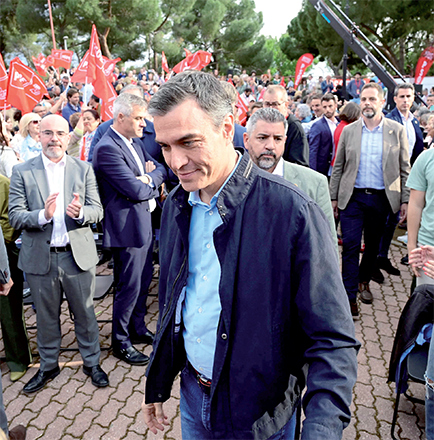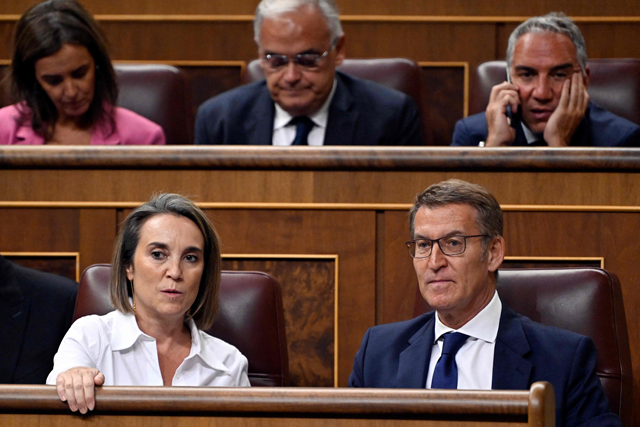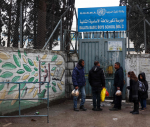You are here
Spain votes in local polls that up pressure on PM
By AFP - May 28,2023 - Last updated at May 28,2023
MADRID — Spaniards were voting on Sunday in local and regional polls seen as a barometer for a year-end general election which surveys suggest Prime Minister Pedro Sanchez will lose, heralding a return of the right.
The stakes are high for Sanchez, whose Socialist Party governs the eurozone’s fourth-largest economy in coalition with the far-left Podemos.
Voters are casting ballots for mayors in 8,131 municipalities while also electing leaders and assemblies in 12 of Spain’s 17 regions — 10 of which are currently run by the Socialists.
In an update at 2:00pm (12:00 GMT), five hours into voting, participation in the local elections stood at 36.54 per cent, or 1.59 percentage points higher than in the 2019 polls, official figures showed.
Some 35.5 million people are voting in the local elections while 18.3 million are eligible to cast ballots in the regional polls.
Balloting ends at 8:00pm, with initial results due out two hours later.
Sanchez has been in office since 2018, and Sunday’s elections find him facing several obstacles: Voter fatigue with his left-wing government, soaring inflation and falling purchasing power.
“I do think it’s an important test [ahead of the year-end elections]. It’s the only way we have of expressing our opinion about all these years they’ve been in government,” 61-year-old doctor Maria Alonso told AFPTV after voting in Madrid, without saying who earnt her vote.
Microbiologist Irene Diaz said the local and regional polls “were as important” as the upcoming general election.
“At the end of the day, these are elections in your city which involve laws and legislation that will end up impacting your day-to-day life,” the 30-year-old said.
Right-wing targets ‘Sanchismo’
Sanchez expressed confidence that voters would cast their ballots responsibly.
“Most of our citizens will vote positively... for what is important: For public healthcare, public education and housing policies for our young people,” he said after voting in Madrid.
Opposition leader Alberto Nunez Feijoo, head of the right-wing Popular Party (PP), urged people “to vote massively” and ensure the next government was a strong one.
“We have difficult years ahead of us but... the stronger the government, the stronger our democracy will be and the faster we will get out of the economic, institutional and social problems we have in our country,” he said.
Feijoo has denounced Sanchez as not only pandering to the far left but also to the Basque and Catalan separatist parties on which his minority government has relied for parliamentary support.
He has positioned Sunday’s vote as a referendum on “Sanchismo”, a derogatory term for Sanchez’s policies.
In his campaign closing remarks, Sanchez focused on his government’s record in bolstering the economy, fighting drought and managing Spain’s increasingly sparse water resources.
“Social democratic policies suit Spain a lot better than neo-liberal policies because we manage the economy a lot better,” he said.
Of the 12 regions where new leaders will be elected, 10 are currently run by Socialists, either alone or in coalition.
The number of regions the PP manages to wrest from the Socialists will be important in determining public perceptions of whether Feijoo has won this first round — and whether his victory in the year-end general election is a foregone conclusion.
A far-right problem
But Feijoo has his own problems, in particular the far-right Vox, the third-largest party in parliament, which hopes to become an indispensable partner for the PP.
Since last year, the two parties have governed together in just one region, Castilla y Leon, which was not voting on Sunday.
Aware that the key to winning the general election is conquering the centre, Feijoo has sought to moderate the PP’s line since taking over last year, while also keeping Vox at a distance.
A strong regional showing by Vox would put him on the back foot.
The campaign, which ended Friday, was marred in the final week by allegations of fraud involving postal votes, largely implicating individuals allied with the Socialists.
The allegations pose yet another hurdle for Sanchez, who has made good governance a priority in contrast to the corruption of various former right-wing governments.
Related Articles
MADRID — Spain votes on Sunday in local and regional elections which will test Socialist Prime Minister Pedro Sanchez’s chances of remaining
MADRID — Spain voted on Sunday in an early general election in which the conservative Popular Party (PP) was tipped to beat Prime Minister P
MADRID — Alberto Nunez-Feijoo defended his bid to become Spain’s next prime minister in parliament on Tuesday, a day before an inauguration

















